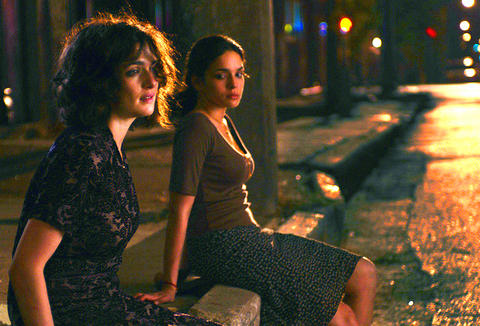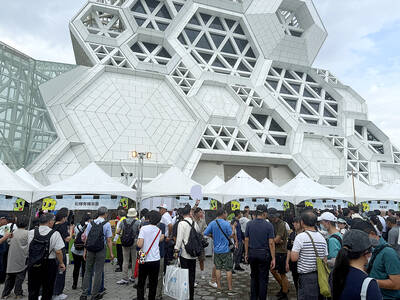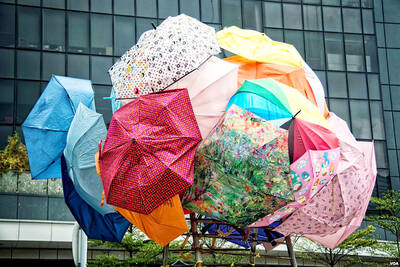Tradition has it that the Cannes opening night film is always met with a passionate response, either cheered to the rafters or booed to oblivion or sprayed with a turbulent cocktail of the two. My Blueberry Nights, by contrast, wrapped up with a discreet shuffle towards the exit door. On balance, that seemed the most damning verdict of all.
Over the past decade or so, Hong Kong director Wong Kar Wai (王家衛) has established himself as one of the most vital and distinctive talents in world cinema. But he loses his way badly on his first English-language outing, an American road movie that relegates him to the role of a passive, swooning tourist amid a blur of neon signs, smoky bars and open freeways. Admittedly My Blueberry Nights doesn't quite go so far as to feature a gum-chewing hitchhiker, or a Native American spouting soulful wisdom. But the rest of the genre tropes are all trotted out with a woozy abandon.
If My Blueberry Nights is a love letter to US pop culture, it's also a valentine to its star. The film marks the acting debut of singer Norah Jones who headlines as Elizabeth, the self-styled "girl with a broken heart." Jilted by her New York boyfriend, Elizabeth lights out for territories in search of herself (or possibly some more blueberry pie). Along the way we get to see her smile, cry and pull an exquisite little frown that paints heartbreaking lines across that porcelain brow. When Wong isn't training his camera on an illuminated jukebox, or an open-top sports car, you can bet he'll have it fastened like a limpet on this actor's face.

PHOTO COURTESY OF CMC
Credit where it's due, Jones copes well with the attention, in that her performance is easy and unobtrusive without ever quite communicating any great depth of feeling or life-changing epiphany. Weirdly, it's her more experienced co-stars who struggle. Natalie Portman toils against miscasting as a brassy gambler, while Jude Law is overly winsome as the good-hearted owner of a Manhattan cafe. Playing the role of a frazzled Memphis belle, Rachel Weisz manages a pitch-perfect accent and certainly looks the part. If only Wong hadn't chosen to introduce her in comical slow motion, sashaying into the bar to the strains of Try a Little Tenderness. It's the sort of humiliating entrance that no actor can hope to rebound from; the equivalent of walking in with her skirt hitched into her knickers.
But then My Blueberry Nights is full of such false notes, such lost-in-translation moments that might conceivably have worked in a Hong Kong setting but fall flat on the road to California. True to form, Wong's curtain raiser is beautiful to look at and unabashedly romantic. But it is also vapid and ephemeral, trading in a kind of karaoke Americana that bounces us from cafe to bar to truck stop for the simple reason that they are there to be bounced between. Taking off for Vegas, our heroine reflects that "what should have taken hours went on for days and what should have been a short ride became a long one." She might have been talking about the whole of My Blueberry Nights.

PHOTO COURTESY OF CMC

Water management is one of the most powerful forces shaping modern Taiwan’s landscapes and politics. Many of Taiwan’s township and county boundaries are defined by watersheds. The current course of the mighty Jhuoshuei River (濁水溪) was largely established by Japanese embankment building during the 1918-1923 period. Taoyuan is dotted with ponds constructed by settlers from China during the Qing period. Countless local civic actions have been driven by opposition to water projects. Last week something like 2,600mm of rain fell on southern Taiwan in seven days, peaking at over 2,800mm in Duona (多納) in Kaohsiung’s Maolin District (茂林), according to

It’s Aug. 8, Father’s Day in Taiwan. I asked a Chinese chatbot a simple question: “How is Father’s Day celebrated in Taiwan and China?” The answer was as ideological as it was unexpected. The AI said Taiwan is “a region” (地區) and “a province of China” (中國的省份). It then adopted the collective pronoun “we” to praise the holiday in the voice of the “Chinese government,” saying Father’s Day aligns with “core socialist values” of the “Chinese nation.” The chatbot was DeepSeek, the fastest growing app ever to reach 100 million users (in seven days!) and one of the world’s most advanced and

The latest edition of the Japan-Taiwan Fruit Festival took place in Kaohsiung on July 26 and 27. During the weekend, the dockside in front of the iconic Music Center was full of food stalls, and a stage welcomed performers. After the French-themed festival earlier in the summer, this is another example of Kaohsiung’s efforts to make the city more international. The event was originally initiated by the Japan-Taiwan Exchange Association in 2022. The goal was “to commemorate [the association’s] 50th anniversary and further strengthen the longstanding friendship between Japan and Taiwan,” says Kaohsiung Director-General of International Affairs Chang Yen-ching (張硯卿). “The first two editions

It was Christmas Eve 2024 and 19-year-old Chloe Cheung was lying in bed at home in Leeds when she found out the Chinese authorities had put a bounty on her head. As she scrolled through Instagram looking at festive songs, a stream of messages from old school friends started coming into her phone. Look at the news, they told her. Media outlets across east Asia were reporting that Cheung, who had just finished her A-levels, had been declared a threat to national security by officials in Hong Kong. There was an offer of HK$1m (NT$3.81 million) to anyone who could assist